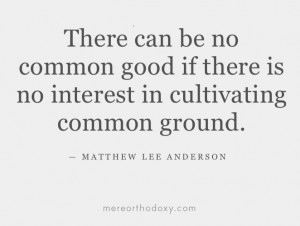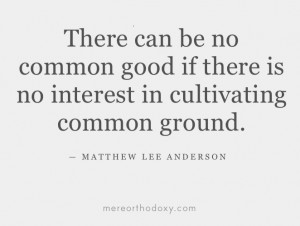Now that we have passed the high point in the American political cycle and quickly headed into the holiday season, it’s time to think about repairing the political fissures with our friends and families. Over the past few years, concerns about the polarization of political life have grown considerably. Pew Research noted this past spring that polarization has increased, and while the intense campaign season skews perceptions—the point right now is winning, after all—it’s hard to shake the impression that Americans of various political persuasions find themselves a long ways apart.
Of course, “polarization” and its variations are not mere descriptors: they inevitably carry a sense of judgment, a sense that the current state of affairs simply can’t continue. The instinctive objection to polarization is understandable: getting along together is one of those kindergarten rules that we were all supposed to have learned.
But therein lies the problem. As a term, “polarization” conceals more than its critics often let on. There is nothing intrinsically problematic about approaching politics from two different poles, two fundamentally different standpoints. That is simply a fancy name for “disagreement,” which is one of those quirky human phenomena that make life interesting. As Bruce Thornton pointed out while audaciously (or not) praising polarization, it isn’t “a political dysfunction, but rather the sign that free Americans take their fundamental political ideals seriously.”
Still, were our democratic discourse limited to mere disagreement over fundamental visions, I suspect there would be far less hand-wringing over our current atmosphere. The real problem seems to be that people are uncertain about what to do with our disagreements, how to open and conduct conversations across the aisle without sacrificing our core convictions.
That sort of dialogue is easier praised than practiced, which is why it is very frequently talked about and only rarely implemented. When it comes down to it, then if the two visions of the world are “fundamentally” different, some sort of translation has to go on. When the differences in outlook go all the way down, then it can be a struggle to find the sort of common concepts and terms that allow a fruitful discussion to go forward. And if the “first things” of our framework are really at stake, then it can be easy to slip into a belligerent defense rather than entering into open inquiry.
The paradox, though, is that the more confident we are in our foundations, the more easily we can temporarily suspend them in a conversation to see whether they turn out to be true. Confidence, like all virtues, has its false and distorted approximations. And the reactionary, hand-wringing subcurrent of the American conservative movement actually sounds more like intellectual anxiety than anything else. To twist around a Teddy Roosevelt line, conservatives who are confident in their positions will be able to speak softly precisely because they carry a big intellectual stick.
That frames our role in such a dialogue negatively, in terms of defense. And sometimes, defense is precisely what is called for. As Chesterton pointed out, there are thoughts that stop thought—and they deserve a good dose of satire and probably even intellectual scorn. But for most issues, politics is not such an arena. There can be no common good if there is no interest in cultivating common ground. While we may start our expeditions from two separate poles, there is something to be said for meeting to explore the terrain together. A social order where people are able to speak together isn’t the only good we should seek, but it is a good.
One way to cultivate such common ground in our own local communities is through what some of called “intellectual empathy,” or the decision to enter into a person’s way of the seeing the world and look along with them. It is, in a sense, an imaginative exercise that goes beyond the “willing suspension of disbelief” toward the granting of principles and premises that we may very well like to reject in order to see how the whole framework holds together—if the whole framework holds together. Intellectual empathy is a form of seeing how. As in, “Oh, I see how you could think that. It’s wrong, but I can see how it might make sense.” It is an act that is aimed, first and foremost, toward the good of understanding, a good that persuasion may flow from but can never precede.
Like all virtues, intellectual empathy needs some sharp edges to be of much use.
Login to read more
Sign in or create a free account to access Subscriber-only content.
Topics:
